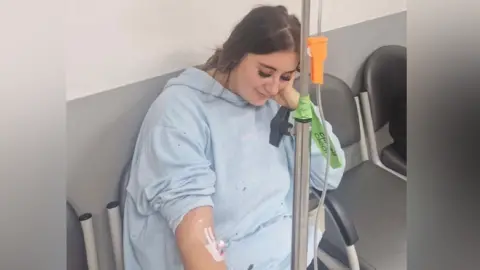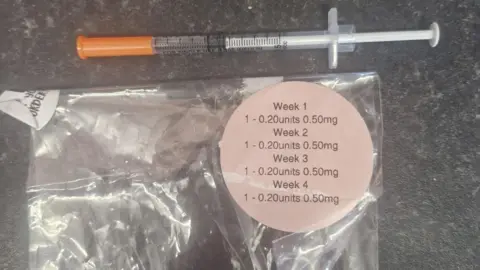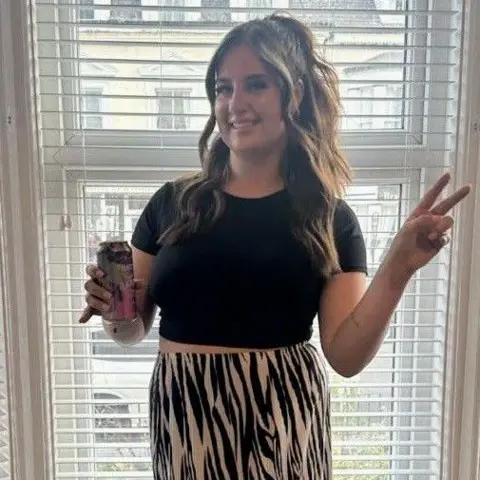'I thought I'd die after injecting black market anti-obesity drug'
 Paige Roberts
Paige RobertsBlack market weight-loss drugs left a woman thinking she was going to die after do-it-yourself injections put her in hospital.
Paige Roberts, 24, looked for anti-obesity medication on social media after her GP advised her to lose weight.
After the first self-administered injection of what she was told was semaglutide - diabetes medication which is illegal to sell without a prescription - she started vomiting and feeling dizzy and sick.
The Royal College of GPs (RCGP Cymru) said buying weight-loss drugs without prescription was highly dangerous.
Ms Roberts, a healthcare assistant from Llandudno, Conwy county, does not qualify for weight-loss medication on the NHS as she weighs 13st (82kg) and has a body mass index of 28.5, so she is not classed as obese.
She said she was told weight loss could help her start having periods again after they stopped due to bloating caused by polycystic ovary syndrome.
She spent £80 on four pre-filled syringes with instructions to use one a week for four weeks.
She was not initially worried as nausea was a known side effect, but went to A&E at Ysbyty Glan Clwyd when she was still vomiting after 48 hours.
 Paige Roberts
Paige RobertsStaff told her lots of people had been admitted to hospital after taking weight-loss drugs and Ms Roberts said she was informed many on the black market were amphetamine-based.
"I was worried I was going to die of dehydration because I couldn't keep anything in my stomach," she said.
After liver and kidney function tests and time on a drip, Ms Roberts was allowed to go home, but she said she wanted others to be aware of the dangers.
She added: "Influencers on social media platforms like TikTok and Instagram only show the good things that happen and say 'look how good we look', which makes you think you can get that as well."
Ms Roberts also believes the injections were "too easy" to get hold of without professionals to prescribe or advise.
RCGP Cymru said prevention and good nutrition were better solutions than weight-loss medication.
"Acquiring weight-loss drugs online without prescription is highly dangerous," it added.
The Medicines and Healthcare products Regulatory Agency previously warned people not to buy pre-filled pens claiming to contain weight-loss drugs, but to consult a healthcare professional qualified to prescribe medicines.
UK government health secretary Wes Streeting said weight-loss drugs could be "game changers" when taken alongside a healthy diet and exercise, but warned against taking the drugs without medical supervision.
 Paige Roberts
Paige RobertsAre weight loss jabs available on the NHS?
Two drugs - semaglutide and tirzerpatide - are on the market under the brand names Wegovy and Mounjaro.
Semaglutide is also in diabetes drug ozempic.
These appetite suppressants can be self-administered as weekly injections via pre-filled pens in the upper arm, thigh or stomach.
People must have at least one existing weight-related health condition, such as high blood pressure, and be obese to qualify.
Those not classed as obese can be given the drug if they are overweight and have cardiovascular disease.
It is illegal to sell semaglutide without a prescription, but drugs can be bought privately, including at supermarkets, chemists and high-street clinics, with pens costing between £200 and £300.
Are weight loss jabs safe?
Common side effects include feeling sick, vomiting, bloating, constipation and diarrhoea. Some report hair loss and, in rare cases, gallbladder, kidney problems and depression.
Experts warn complications can be worse if drugs are abused, either to lose weight quickly or bought from unregulated sellers.
 Paige Roberts
Paige RobertsAnalysis - Jenny Rees, BBC Wales health correspondent
The search for solutions, or relief from discomfort and pain, will be familiar to so many people.
New products, medications and treatments will always create a buzz if they've offered signs of success in alleviating those symptoms - to those appropriately prescribed them.
But that buzz creates a demand.
And where there's demand, there's an opportunity.
We see it in the high street, where the market place steps up to provide "solutions" at every price bracket, when it sees a customer need going unanswered.
This soon spills over into the counterfeits sold in the unlicensed arena: social media and word of mouth.
And here it's anyone's guess as to what you're buying, what it truly contains and how safe it might be.
So many of us will have been tempted by the offer of grand promises, but as we hear so often, if it sounds too good to be true, it probably is.
When in search of medical solutions, it's always best to seek them from medical professionals.
